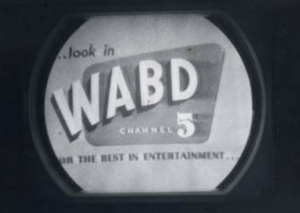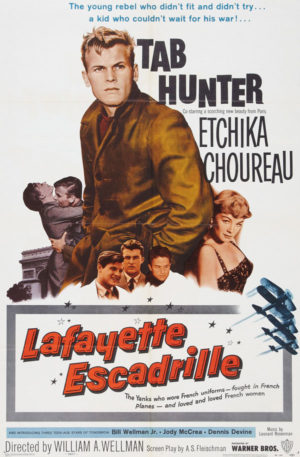It had been about a year and a half since WRCA-TV, NBC’s flagship in New York City, first aired a panel discussion on homosexuality. That program featured a psychologist, a lawyer, and a liberal-for-1956 clergyman, all of them straight. The program was (for 1956) relatively evenhanded and balanced — as balanced as a program like this could be where people were talking about another group of people who weren’t in the room.
But it did ruffle some prominent feathers. New York’s Francis Cardinal Spellman threatened to go to the FCC to have WRCA’s broadcasting license revoked. WRCA reacted by scheduling two more programs in September and January.
 In 1958, WABD, the former flagship station of the defunct DuMont network, decided to host a discussion of homosexuality on its half-hour afternoon public affairs program, Showcase. Its producer decided it might be interesting to have a real live homosexual on live television. He contacted Tony Segura, the New York chapter president of the Mattachine Society. Segura agreed to appear, on the condition that his name wasn’t mentioned and he could wear motorcycle goggles while on the air to hide his face. Those precautions were important: homosexuality was a felony in New York, punishable with up to twenty years in prison.
In 1958, WABD, the former flagship station of the defunct DuMont network, decided to host a discussion of homosexuality on its half-hour afternoon public affairs program, Showcase. Its producer decided it might be interesting to have a real live homosexual on live television. He contacted Tony Segura, the New York chapter president of the Mattachine Society. Segura agreed to appear, on the condition that his name wasn’t mentioned and he could wear motorcycle goggles while on the air to hide his face. Those precautions were important: homosexuality was a felony in New York, punishable with up to twenty years in prison.
The Showcase panel also included psychiatrist Albert Ellis, a so-called ally of the homophile movement. Ellis was popular among a segment of homosexuals who had fully absorbed society’s blanket condemnations. According to Ellis, homosexuals were mentally ill, but so where heterosexuals who were 100% straight. This made him, for the 1950s, even-handed in a still-condemnatory fashion — even though Ellis saw no particular need to try to cure those heterosexuals he found so neurotically straight.
The program dealt mainly with dispelling some of the stereotypes about gay people, a task that was undoubtedly made more difficult by Segura’s relative invisibility. Ellis’s presence didn’t help much either. He repeated his suggestion that homosexuals adjust themselves to a “heterosexual mode of living.” Segura used his half-hour of near-fame to carefully lay out the Mattachine Society’s purpose and history.
Unlike the previous WRCA program, this program generated little public reaction. Even so, the program proved highly contentious among the higher-ups at WABD. For the next day, Showcase had scheduled a follow-up program program about lesbians, with a member of the New York chapter of the Daughters of Bilitis participating. (I have been unable to discover her name.) But fifteen minutes before airtime, word came down that the topic was cancelled and the guests were to talk about something else — anything else.
The program’s host was Fannie Hurst, a popular novelist, short story writer, feminist, and civil rights activist. With the program about to go live, she scrambled to find a substitute topic that the assembled guests could talk about. As it happened, one of those guests, Helen King, had written a book about handwriting analysis. That would be the safe topic of the day. New York DoB member Lorrie Talbot described this program for The Ladder:
“Having received your letter yesterday morning — there I sat, pencil poised over a fresh white sheet of paper on my coffee table — my eyes glued to the face of the bearded gentleman who apparently introduces the program, SHOWCASE. He was saying in soft, promising tones that we were about to he ar a discus sion of a ‘very interesting’ subject. I lifted my pencil higher…
“Anyhow, poor Miss Fannie Hurst came on and introduced her guests, and with remarkable restraint, advised us viewers that the program which had been promised for today had undergone severe censorship some 15 minutes before show time. Severity in this case meaning that she had been directed to simply drop the topic. I swear, as I was dropping my ready pencil, I truly did see the stenciled letters swim across my eyes — VERBOTEN.
“So that was kind of that — except for some rattier courageous remarks made by Miss Hurst (indirectly) on censorship of valid social questions. She is a writer, you know, and inclined to metaphor, but in this case, well put! She said something to the effect that we (society) have not as yet come out of that ‘strange, dark jungle of fear’. And with marvelous diplomacy, I thought, made it quite clear to all viewers that the responsibility did not lie with her. … She referred to the previous day’s discussion … thusly: ‘After the high plateau reached yesterday’ she regretted that ‘the station feels we are a little premature.'”
And with this, the discussion about handwriting analysis began, although King did manage to squeeze one mention of homosexuality. “To my amusement,” wrote Talbot, “at Miss Hurst’s prodding, Miss King chose an example of her experiences in her work from a matter that had to do with a homosexual personality. Probably innocent, but l imagine it must have made some exeoutive itch a little.”
The half-hour program ended early, with Hurst apologizing again for the censorship imposed on the program. She then signed off with a “hail but not farewell.”
Epilogue:
The following Labor Day weekend, the Mattachine Society held its national convention at the Barbizon-Plaza Hotel in New York City. Fannie Hurst moderated an afternoon panel discussion. Before the panel began, Hurst admitted that until the television programs the previous March, she had never heard of the Mattachine Society and knew almost nothing of homosexuality. The Ladder, the official publication of the Daughters of Bilitis, described her talk as the “emotional highlight of the convention”:
“I represent the man and woman on the street,” Miss Hurst said, referring to her scant knowledge. “I doubt if my mother ever heard the homosexuality, or would have known what it meant. It seems we have come far when we are even disposed to discuss it.”
Miss Hurst pointed out that the discussions at the convention were on a rather intellectual plane, stressing the legal and psychological aspects. “We can never hope,” she said, “until the masses of the people understand. The attitude here is good, but you must reach the people.
“Until the great, great gadgets of modern communication throw this message out to the people, with their slow compassions, their slow thinking, in their own idiom, we won’t get the understanding necessary. Attitudes being [sic] with the people, and they must be told through TV, magazines and the newspapers.”
It was pointed out from the floor that press releases on the convention had been sent to all New York newspapers with the result that one paper had sent a reporter who had written an article later killed by his editor as “not fit for a family newspaper.”
This did not surprise Miss Hurst. “This just shows the size of the job ahead,” she said. “It must be a slow process of erosion.” She pointed out that she fully expects her TV sponsors to present the second program on homosexuality previously cancelled. This through pounding and pounding away by herself and others connected with the program.
Despite Hurst’s best efforts, that second program never came about.
No film or transcript of either program is known to exist.
On the Timeline:
![]() March 10, 1958: New York’s WABD-TV airs a discussion of male homosexuality.
March 10, 1958: New York’s WABD-TV airs a discussion of male homosexuality.
![]() March 11, 1958: New York’s WABD-TV cancels a follow-up program on lesbians.
March 11, 1958: New York’s WABD-TV cancels a follow-up program on lesbians.
Periscope:
For March 10-11, 1950:
| President: | Dwight D. Eisenhower (R) | |||
| Vice-President: | Richard M. Nixon (R) | |||
| House: | 233 (D) 232 (D) |
197 (R) | 0 (Other) | 5 (Vacant) 6 (Vacant) |
| Southern states: | 99 (D) | 7 (R) | ||
| Senate: | 49 (D) | 47 (R) | ||
| Southern states: | 22 (D) | |||
| Inflation: | 3.6% | |||
| Unemployment: | 6.7% | |||
 Headlines: Rep. John J. Dempsey (D-NM) dies at the age of 78 from a viral infection; he had been hospitalized for two weeks. The unemployment rate reachers 6.7%, surpassing the peak unemployment rate of the 1953-1954 recession. Congressional representatives from both parties call for increasing unemployment insurance and accelerating public works spending to combat rising unemployment in the eight-month-old recession. Vice President Nixon says he favors a tax cut over increased spending if more anti-receission measures are needed. A B-47 bomber accidentally drops an unarmed atomic bomb onto a farm near Florence, South Carolina. Cuban dictator Fulgencio Batista promises to hold fair elections on June 1 amid continuing violence with Fidel Castro’s armed rebels.
Headlines: Rep. John J. Dempsey (D-NM) dies at the age of 78 from a viral infection; he had been hospitalized for two weeks. The unemployment rate reachers 6.7%, surpassing the peak unemployment rate of the 1953-1954 recession. Congressional representatives from both parties call for increasing unemployment insurance and accelerating public works spending to combat rising unemployment in the eight-month-old recession. Vice President Nixon says he favors a tax cut over increased spending if more anti-receission measures are needed. A B-47 bomber accidentally drops an unarmed atomic bomb onto a farm near Florence, South Carolina. Cuban dictator Fulgencio Batista promises to hold fair elections on June 1 amid continuing violence with Fidel Castro’s armed rebels.
 On the radio: “Tequila” by the Champs, “Sweet Little Sixteen” by Chuck Berry, “I Don’t” by Elvis Presley, “26 Miles (Santa Catalina)” by the Four Preps, “Oh Julie” by the Crescendos, “Who’s Sorry Now” by Connie Francis, “Get a Job” by the Silhouettes, “The Walk” by Jimmie McCracklin and His Band, “Sugartime” by the McGuire Sisters, “Good Golly, Miss Molly” by Little Richard.
On the radio: “Tequila” by the Champs, “Sweet Little Sixteen” by Chuck Berry, “I Don’t” by Elvis Presley, “26 Miles (Santa Catalina)” by the Four Preps, “Oh Julie” by the Crescendos, “Who’s Sorry Now” by Connie Francis, “Get a Job” by the Silhouettes, “The Walk” by Jimmie McCracklin and His Band, “Sugartime” by the McGuire Sisters, “Good Golly, Miss Molly” by Little Richard.

On television: Gunsmoke (CBS), The Danny Thomas Show (CBS), Tales of Wells Fargo (NBC), Have Gun, Will Travel (CBS), I’ve Got a Secret (CBS), The Life and Legend of Wyatt Earp (ABC), General Electric Theater (CBS), The Restless Gun (NBC), December Bride (CBS), You Bet Your Life (NBC).
New York Times best sellers: Fiction: Anatomy of a Murder by Robert Traver, By Love Possessed by James Gould Cozzens, Rally Round the Flag, Boys! by Max Shulman. Non-fiction: Please Don’t Eat the Daisies by Jean Kerr, Kids Say the Darndest Things! by Art Linkletter, Baruch: My Own Story by Bernard Baruch.
Sources:
Magazines (in chronological order):
Philip Jason. “Mattachine Official Participates on New York Television on Homosexual Subject.” The Mattachine Review 4, no 4 (April 1958): 24-25.
Lorrie Talbot. “A Daughter Watches TV.” The Ladder 2, no. 6 (March 1958): 10-11.
“Mattachine Convention: Prognosis Is Hopeful.” The Ladder 3, no. 1 (October 1958): 11-15, 21-25.
Books:
Edward Alwood. Straight News: Gays, Lesbians and the News Media (New York: Columbia University Press, 1996): 34-35.
![[Emphasis Mine]](http://jimburroway.com/wp-content/uploads/2018/01/WacoRaid1953.jpg)